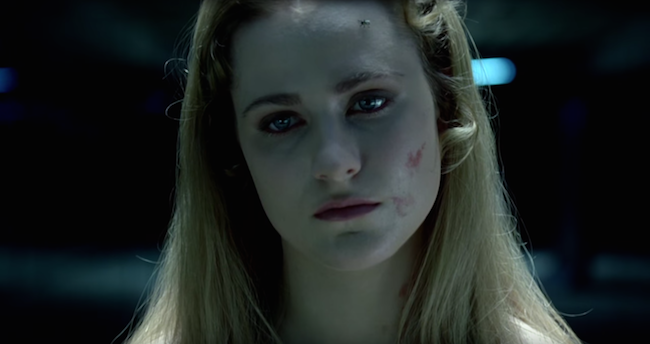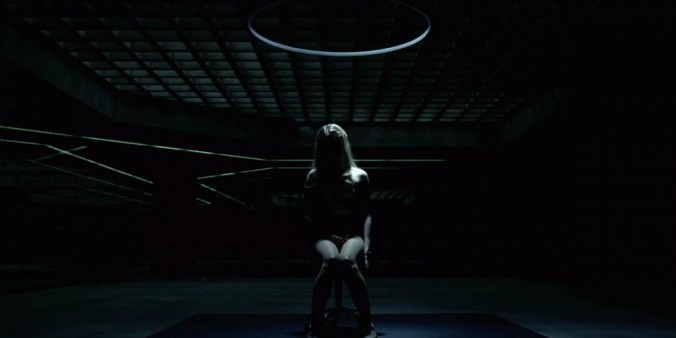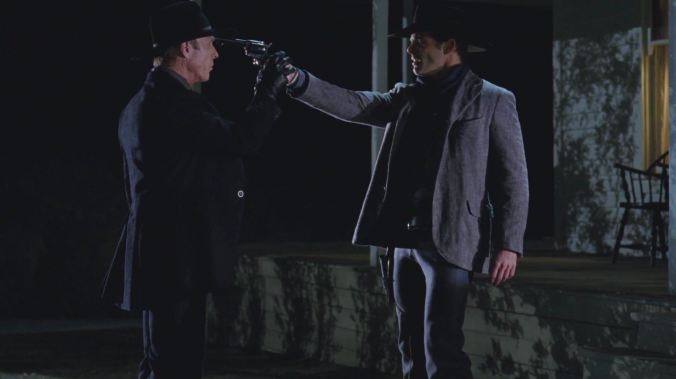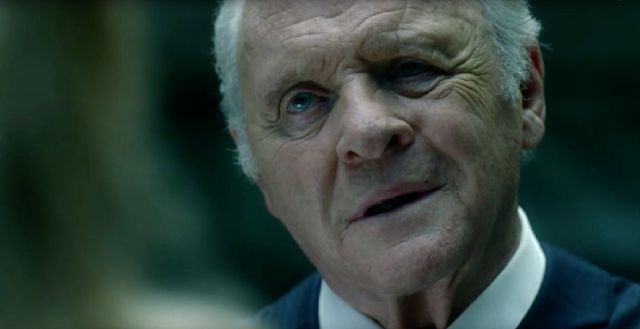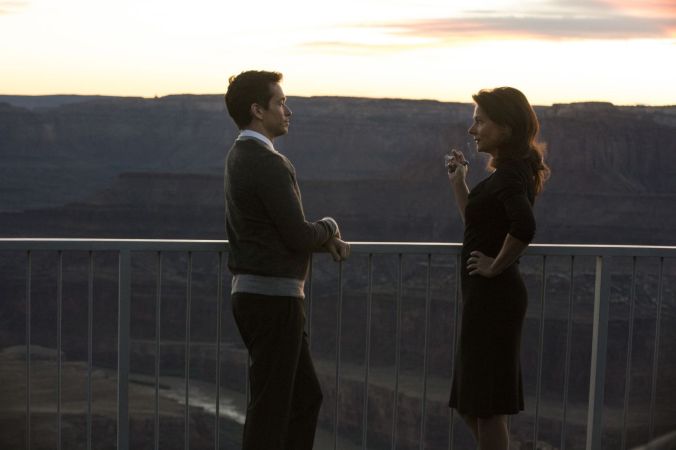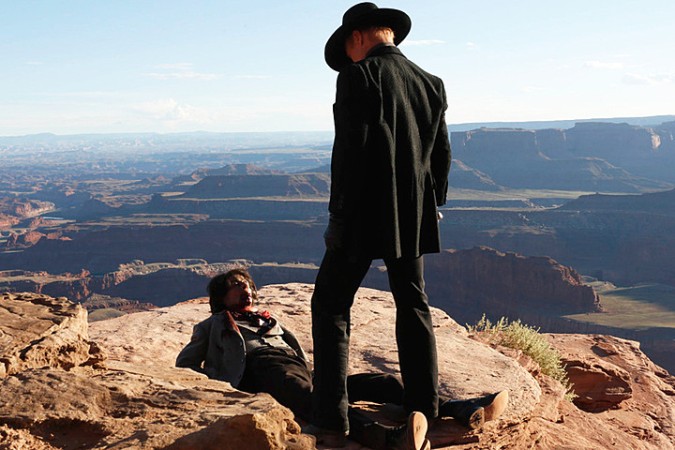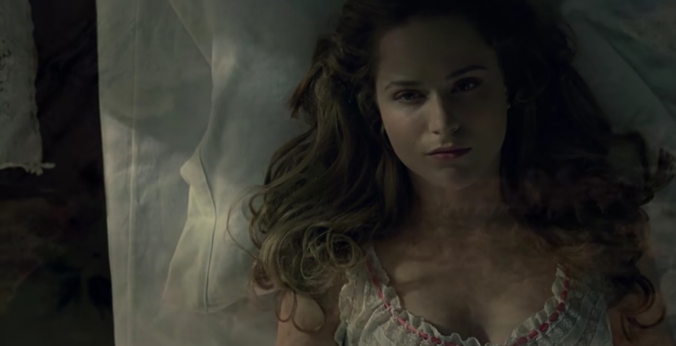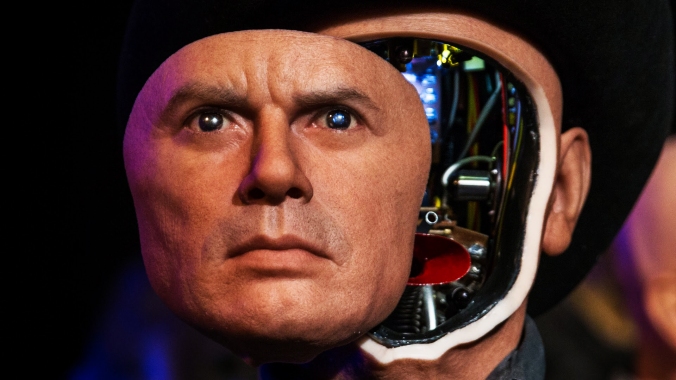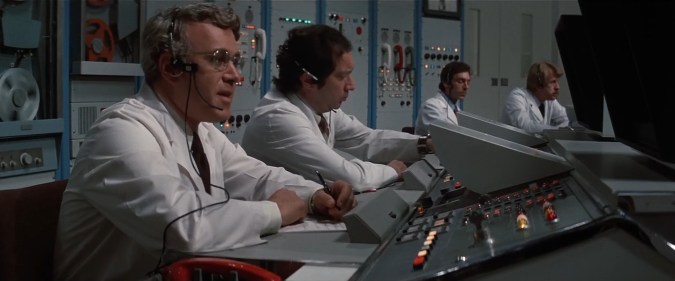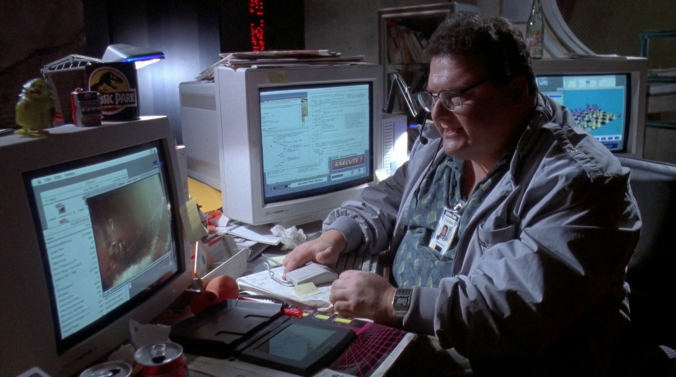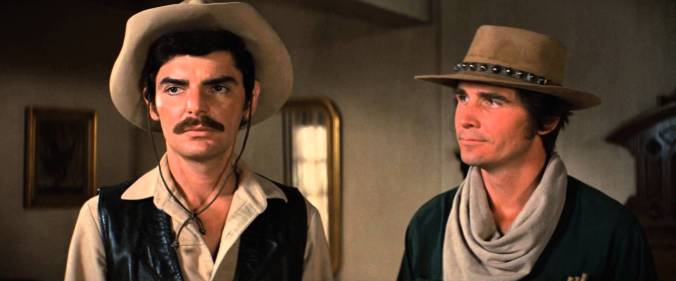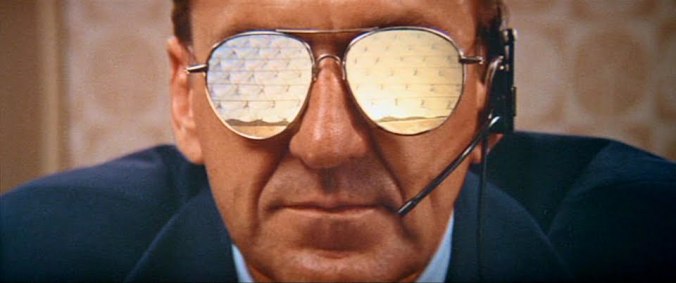After leaving us with a sinister fly swatting and lingering questions about the story’s focus and direction, Westworld returns for its second week… to provide even more burning questions! We meet some new faces, see some new Hosts go off the rails, and generally speaking, things get weird. Spoilers ahead…
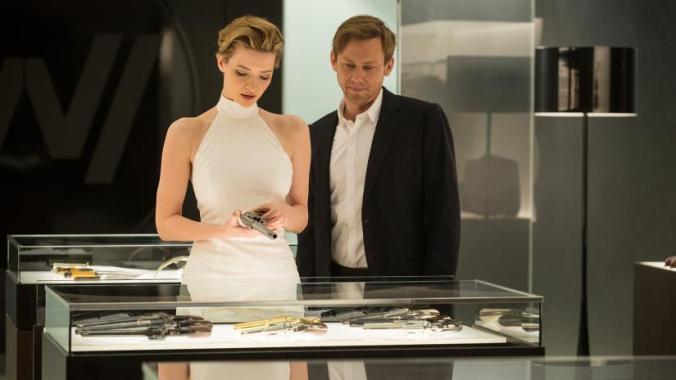
With Dolores on our minds, we reenter HBO’s simultaneously dusty and glossy, futuristic and historical world. And once again, we hear a man commanding Dolores into consciousness: “Wake up, Dolores.” In a glazed, Stepword-Wives sleepwalking mode, she walks out into the middle of the night only to stare into the distance. But who’s commanding Dolores to wake? It sounds like Bernard at first, but then there’s some distortion and it’s not clear who we’re meant to be hearing. Dr. Ford? The Man in Black? Peter Abernathy? Someone else?
After teasing us with a fake-out journey into Westworld from the perspective of someone who seemed to be a tourist last week, we get the real thing this time. …or do we? Yes. Definitely yes. Friendly tourist (and long-lost twin of Liam McPoyle) William enters the park with his dickish friend Logan, a veteran Westworld visitor who only reinforces the impression that most of the wealthy millionaires who visit the park are assholes. I’m not sure if it’s a credit to the show or an unwitting irony that the thoroughly untrustworthy Logan gives the series it’s most overt bit of meta-commentary so far when he tries to sell William on Westworld: “I know that you think that you have a handle on what this is gonna be: guns and tits and all that. You have no idea.” Perhaps the writers testing out a new slogan for the network.
“HBO: guns and tits and all that.”
Our first recognizable audience surrogate, William has shades of Peter Martin, the ordinary, vaguely geeky protagonist of the 1973 movie Westworld, particularly in his relationship with his carefree buddy Logan and his initial skepticism about the park. William tries on hats, admires weapons, and nobly declines the sexual advances of the gorgeous Host who guides him through the park’s glossy antechamber facility. With a white hat (must be a hero!) in hand, William heads through a mysterious door and into a period saloon which quickly reveals itself… to be a train! How does that work exactly? Are there regular trains leaving for Westworld like every half hour, or do the other guests just have to wait if one of the newcomers decides to spend a bunch of time banging his seductive tour guide?
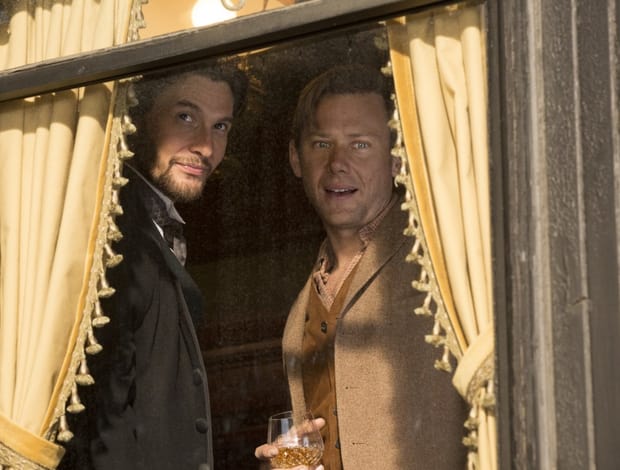
Anyway, we turn our attention to nerd-bros Bernard and Elsie, who are still mulling over the recent glitches. Elsie’s convinced that Peter Abernathy’s problems were serious and possibly contagious, but Bernard believes that Dolores’s problems were fixed with the most recent update. Huh. Wasn’t he the one who said last week that Abernathy’s problems were “miles beyond a glitch”? Surprisingly, after Bernard walks out, Elsie does not lean over and give her fancy tablet a tender, creepy kiss.
Something’s clearly wrong with Dolores, not just because she’s troubled by flashes of memories but also because she periodically and quite suddenly drifts back into her old cheerful self like a sad clown trying to convince a group of second-graders he’s not depressed. Is she faking it? Or is she just glitching out? When she has a flashback (or vision?) of the townsfolk slaughtered, Maeve emerges from her saloon to throw Dolores some shade. But Dolores gives her a death stare and quotes some Shakespeare, and Maeve quite sensibly returns from whence she came.
Meanwhile, the Man in Black, our Cormac McCarthy-esque, quizzical villain with seemingly endless powers, is knocking off more and more Hosts in his quest to discover the “deepest level of the game,” whatever that means. I appreciated at least that in this episode the Delos overseers acknowledge the fact that the Man in Black is keeping their robot repairmen working overtime. Whatever he’s trying to find, presumably it’s okay with them? But then why does that kid say that the maze was “not meant” for the Man in Black? Also, on a side-note, how are knives programmed not to harm fellow guests exactly? Isn’t that a recipe for a disastrous case of mistaken identity? After slaughtering a posse of lawmen and kidnapping the condemned outlaw Lawrence, the Man in Black commands Lawrence to guide him to what he calls “the maze.” Is it a physical maze? A metaphorical maze? Why’s it tattooed on the inside of Kissy’s skull? Mysteries abound.
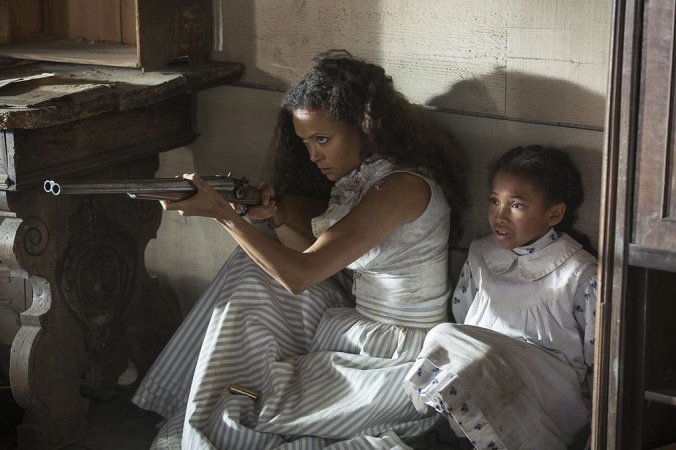
As Maeve demonstrates this episode, Dolores’s Shakespeare quip is not simply philosophizing; it’s some sort of mental trigger like the ones that the Delos employees use to control the Hosts. “The violent delights have violent ends.” Feel any different? Whoever programmed it into the Hosts, it seems to give them access to memories they didn’t know they had. For Maeve, that means a rather traumatic encounter with a group of Native American Hosts, who slaughtered her wagon party and stalked her and her young daughter to their country home. Interesting to see that even in the immersive world narratives of the future, Native Americans get stereotyped as the bloodthirsty bad guys…
Maeve’s new melancholy and confusion has a negative impact on her job performance seducing horny guests, apparently, so Delos brings her in for some questioning. With new storylines looming over Westworld and the higher ups cracking down on “dead weight,” the Delos staff writers (or are they Westworld’s story producers?) put Maeve into sexual overdrive in a last-ditch attempt to get her ratings up. You hear that, viewers? TV characters get paralyzed and sent into a dingy, depressing storage facility if you don’t keep watching. So keep up those HBO GO subscriptions! Regardless, Maeve’s overboard seductiveness only makes things worse. Fortunately, Elsie gets her hand on Maeve next and restores her to her subtle self, managing to say “fuck” a lot and be edgy with a nervous subordinate all the while.
The milquetoast Bernard gives us a few surprises this episode, which gives the extremely capable Jeffrey Wright a few new opportunities to layer his creation with secrets. The lesser of the two surprises, and the most delightful, is his apparent gift with the ladies. Of all the possible romantic pairings in the series, the one I might have suspected least was Bernard and Theresa. It’s still not clear exactly what they see in each other, but it’s clear that Bernard is keeping his distance, emotionally speaking. Bernard’s more substantial surprise is that he’s been having secret liaisons with Dolores, for reasons unknown. He knows about her strange memories, but he hasn’t told anyone about them. Is he the one who put them there? He seems awfully “fascinated” with her aberrant behavior for someone pulling the strings.
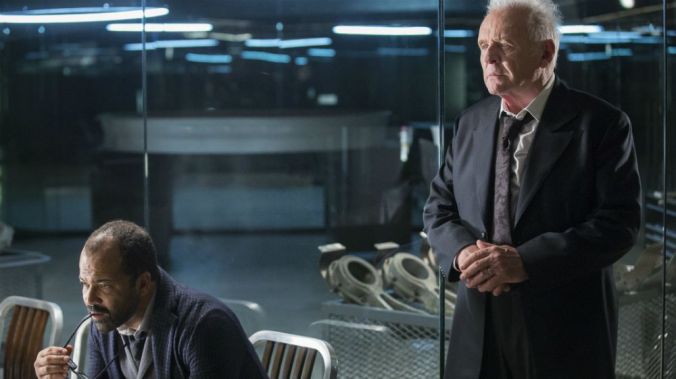
Of course, Bernard’s ongoing bromance with with Ford is the most charming relationship in the series so far. But is Bernard hiding something from his mentor? Is Ford hiding something from him? Ford expands quite a bit in this episode as well. He confirms his penchant for soft-spoken erudition and zen wisdom, reminding Bernard that they’ll have no one to turn to but themselves should the mysteries of Host cognition spiral out of control, but he’s also becoming the most sinister character in Westworld, even more than the Man in Black, since whatever mysteries plague the Man in Black were undoubtedly shaped by Ford himself. The question remains whether Ford holds all the cards as to the future of Westworld or, perhaps more frighteningly, whether he simply has given up trying to control what his creations might do.
Whatever he’s up to, it has something to do with that creepy little steeple in the desert, which is enough to draw even Bernard out into the wilderness for a look, wearing what has to be a non-regulation baseball cap. Are we about to give our Hosts a God? Ford’s vision of the Old West has been suspiciously free of religion so far…
Meanwhile, newcomer buddies Logan and William are revealing their friendship to be… less than friendly. Logan wants to drink, murder, maim and fuck his way through the park, indulging a very HBO orgy with a handful of hookers, including (oh my!) a dude. But William is more like that guy in your DnD campaign who wants to gather strange mushrooms, learn about goblin history, listen to the lengthy tales told by the bards in taverns, and comfort every weeping halfling child. Which is great! It’s just that Logan has his own agenda, and William can’t seem to bring himself to tell Logan to let him do his thing. William also answers the age old question: if you’re fucking a robot with artificial intelligence, is it still considered cheating? (Spoiler: yes, it is.) William refuses to succumb to Clementine’s temptations, but no doubt time will erode his resolve when Westworld inevitably throws him new opportunities for corruption in episodes to come.
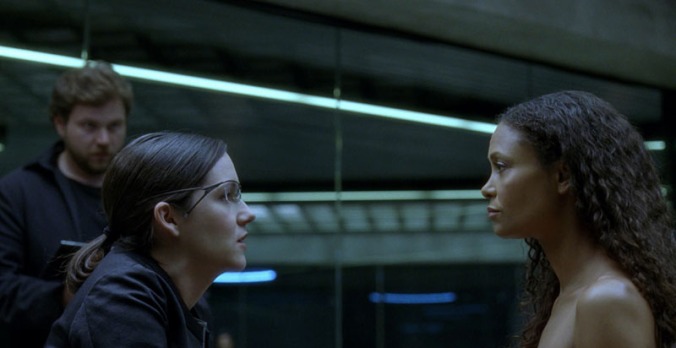
With help from a creepy robot kid (the second of two this episode after Ford’s Dickensian robot version of himself as a child), the Man in Black learns that all he has to do to find the maze he’s looking for is “follow the Blood Arroyo to the place where the snake lays its eggs.” The Man in Black apparently knows what this means, since he takes off in short order with Lawrence in tow, only to break into Maeve’s house and kill her… for some reason. Maeve’s storyline take center stage this episode, primarily because she’s the one who’s getting previous lifetime PTSD. She also gets to make some new bad memories this week! Watching her waking up mid-operation, threaten her repairmen with an engineer and then wander through the Delos facility with her hand clutched over her sliced-open abdomen was prototypical HBO stuff: eerie, gruesome, glossy, vaguely salacious, and dangling plot developments in front of us only to tuck them away for a distant future episode. Maeve may not have escaped the park or even caused a stir for Delos higher ups, but surely she’ll retain some memory of her behind-the-scenes adventure, or else what are we watching this for?
There are a few other strains that pop up and then fizzle away: Teddy’s still as handsome, and put upon, as ever, the Charlie Brown of Westworld. The week, on Westworld… Teddy gets murdered for no reason! Lee Sizemore, the dullest of the show’s many douchebags, haggles for some extra attention in a storyline that’s quickly shut down (both diegetically and non-diegetically) by Ford, although the scene where Ford quietly rips Sizemore’s storytelling philosophy to pieces was fun to watch, and presumably something of a manifesto from the Westworld writers themselves on what they want their show to be. There’s plenty of grandstanding going on so far, I’ve noticed. It remains to be seen whether or not the series can live up to its ideals, particular when so many of the characters seem so… determined, like their robots. Crudely human.
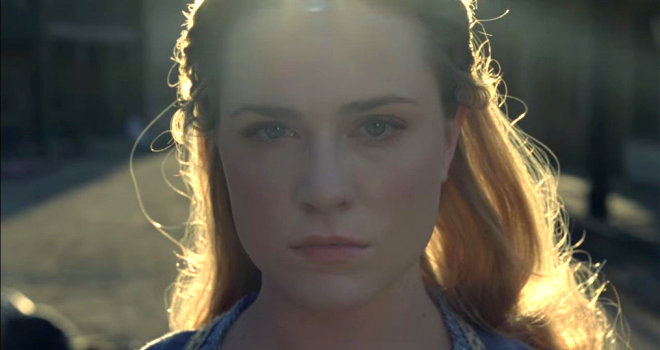
And once again, a Westworld episode ends as it began, on the series’s most publicized and least developed character, Dolores Abernathy, doing something sinister. This time she’s digging up a buried pistol outside her home. Something tells me it isn’t loaded with blanks. But who left it there? We are no doubt meant to wonder, and to wait…
Also, did I miss something re the episode title? What the hell does “Chestnut” mean?
